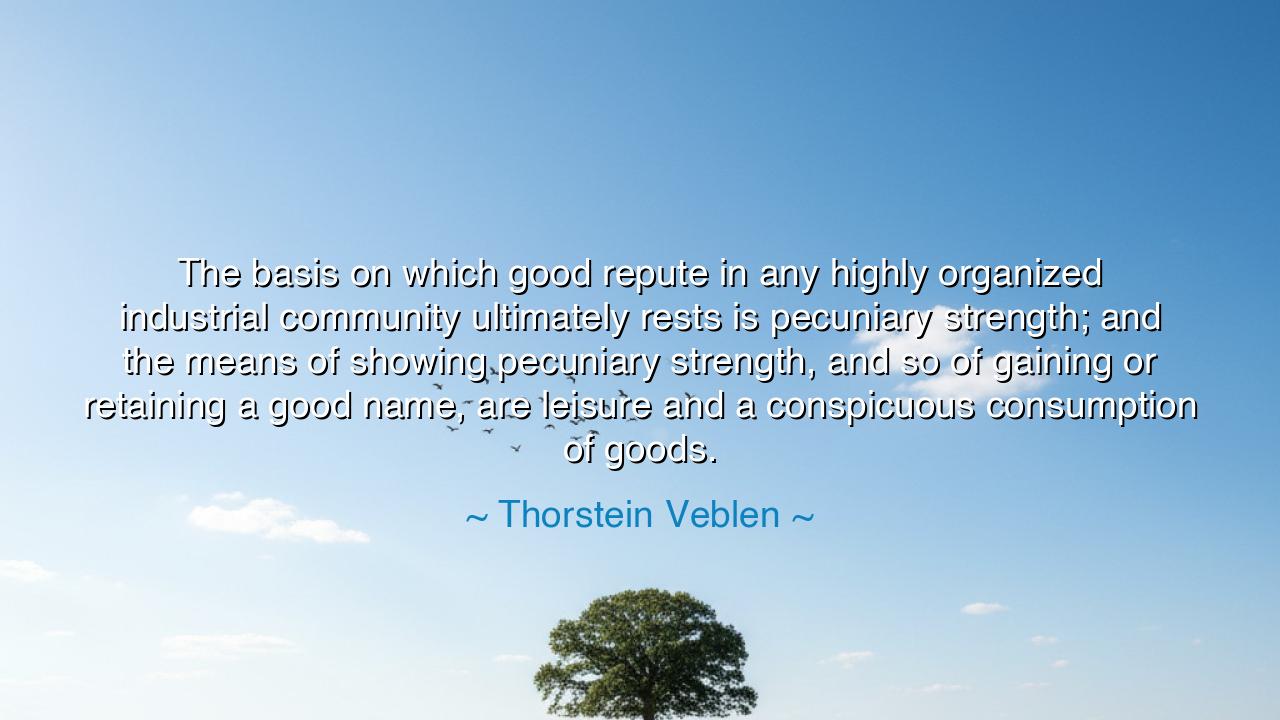
The basis on which good repute in any highly organized
The basis on which good repute in any highly organized industrial community ultimately rests is pecuniary strength; and the means of showing pecuniary strength, and so of gaining or retaining a good name, are leisure and a conspicuous consumption of goods.






Thorstein Veblen, the sharp-eyed observer of society’s hidden laws, once wrote: “The basis on which good repute in any highly organized industrial community ultimately rests is pecuniary strength; and the means of showing pecuniary strength, and so of gaining or retaining a good name, are leisure and a conspicuous consumption of goods.” In this utterance lies a mirror held before the modern age, reflecting its vanities and illusions. Veblen, in his Theory of the Leisure Class (1899), revealed that in the industrial order, honor and fame are not given to the wise, the kind, or the just, but to those who can display their wealth in ways visible to all.
The origin of this thought comes from Veblen’s study of how human societies rank and revere their members. In ancient tribes, the warrior gained repute through valor, the elder through wisdom, the priest through communion with the divine. But in the industrial age, where machines replaced warriors and markets replaced shrines, pecuniary strength—the command over money and possessions—became the new altar before which society bows. And because wealth cannot be seen directly, it must be displayed: through leisure, which proves that one does not need to toil, and through conspicuous consumption, which proves that one has enough to waste.
Consider the lords and nobles of Europe in centuries past. Their castles, feasts, jewels, and vast hunting grounds were not merely for enjoyment, but for show. To live idly while others labored was to demonstrate superiority; to wear robes of silk and ride horses adorned with gold was to proclaim, “I am not bound by need.” Veblen saw that this same principle, cloaked in modern dress, governed the industrial society of his time—and still governs ours today. The luxury car, the sprawling mansion, the name-brand garment, the vacation flaunted on public display: all are the heirs of this ancient ritual of display.
Yet Veblen’s words are not spoken in admiration, but in warning. For he understood that pecuniary strength as a foundation for honor is hollow. True greatness does not rest upon possessions, nor does dignity arise from waste. A society that measures worth by the shine of jewels or the idleness of its elite forgets the higher virtues of courage, wisdom, and compassion. It builds idols of wealth but leaves its spirit poor. Veblen’s insight cuts deep: if repute rests only upon gold, then it is as fragile as sand, collapsing when the tides of fortune shift.
History itself proves the danger. Rome, once a republic of stern virtue, fell into decadence when its leaders sought honor not in service but in spectacle. Gladiatorial games, vast banquets, and endless displays of conspicuous consumption drained the treasury and hollowed the character of its people. What followed was decline, for a nation that worships wealth above virtue prepares its own ruin. Veblen’s wisdom reminds us that the measure of a people cannot be found in its luxuries, but in its character.
And yet, his insight also reveals a truth of human nature: that the desire for good repute is universal, and people will always seek ways to prove their worth. The question then is not whether society will admire certain displays, but which displays it chooses to value. If it values waste, it will honor the wasteful. If it values leisure, it will honor idleness. But if it values service, kindness, or wisdom, then these will become the paths to honor. Thus, the choice belongs not only to individuals but to the culture they inhabit.
So let Veblen’s words endure as both critique and challenge. Understand the allure of pecuniary strength, but do not mistake it for true strength. See through the mirage of conspicuous consumption, and do not let your soul be bound by it. Instead, build your good name upon deeds, virtues, and service to others. And when you spend, let it not be for show, but for purpose. For the wealth of possessions fades, but the wealth of the spirit—honor, courage, and compassion—shines long after gold has turned to dust.






AAdministratorAdministrator
Welcome, honored guests. Please leave a comment, we will respond soon